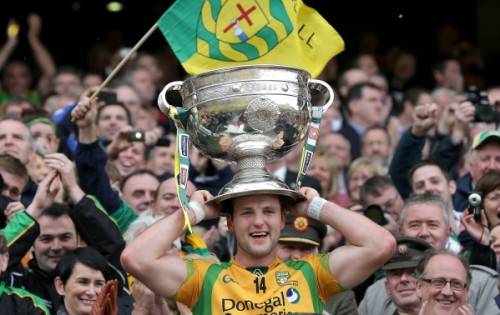On the day before last New Year’s Eve, Rory Gallagher assembled his full Donegal squad in Downings, the Gaeltacht village on the Rosguill peninsula.
It was a crisp December day and after the players had finished their session on the GAA pitch, which overlooks the Atlantic Ocean across the bays of Sheephaven and Mulroy, they made their way down to the ocean to soothe the lactic acid from their legs and release the tension in their minds.
It was a new beginning because the wheel had turned full circle. When Jim McGuinness took over in the autumn of 2010, his first collective meeting with the players was in the Rosapenna hotel in Downings, which is within view of the GAA field.
McGuinness’ four years in charge was a glorious era for Donegal football, but Gallagher’s immediate priority was to ensure that Donegal’s world stayed the same and that McGuinness’ departure didn’t signal the dismantling of football’s New Order.
McGuinness’ project can easily be measured through the massive success he delivered but the rich culture and ambition he embroidered into the soul of Donegal football left a far more indelible imprint than any amount of cups and medals.
He changed football. He completely altered Donegal’s mindset. He made Donegal people immensely proud again of their footballers and their heritage.
He established a template and level of professionalism which set the example for the Donegal squad as an entity but its creation had been so organically systematic that that was Gallagher’s starting point.
Could he maintain what Donegal had created? Could he grow it further? Could Donegal flourish under his management in the way they had flowered under McGuinness?
They were all legitimate questions given the way McGuinness’ time in charge appeared to rhyme with the natural life cycle of this squad. New players had rejuvenated the team last year but 12 of the panel had been around since the 2006 season and the digits on the collective mileage clock had been further increased with each grinding season under McGuinness.
The squad was still a decent age profile while the landscape was gradually changing behind them. Donegal have contested the last three Ulster U-21 finals and had reached last year’s All-Ireland minor final for the first time.
Yet the group Gallagher inherited, and which he had helped McGuinness originally build and mould as his number two for three years, was still the squad around which his management would be framed and ultimately judged.
Gallagher’s first act to keep the machine ticking over was to apply a different form of lubrication oil. Nobody could ever argue with McGuinness’ approach but every player’s training template had the same starting and finishing point. Gallagher began his reign in December with a series of trial games but the older and more seasoned players were allowed recover from injuries before being gradually eased back into the heavy work.
McGuinness had been so unique that nobody was expected to follow his lead, but Gallagher was the best placed to tread in his footsteps. His key role in establishing the fundamentals of Donegal’s system removed much of the concern associated with McGuinness’ departure.
His knowledge and close links with the players was another statement of continuity but Gallagher had the ambition and confidence to create and forge his own identity.
Donegal’s championship to date has also shown how Gallagher has introduced more tactical versatility, more freedom to play. For a start, they’re kicking the ball more often. Under McGuinness, Donegal’s base philosophy was to hold possession at all costs. In the second half of last year’s All-Ireland final, Donegal only kick-passed eight times.
Donegal were harnessed to a very set system but the opening quarter against Tyrone showed how Gallagher has loosened it. Their performance against Armagh neatly encapsulated how much Gallagher had evolved the system.
Donegal exploited the weaknesses in the Mayo full-back line early in the 2012 All-Ireland final but they took that tactic to another level against Armagh. At various stages, they had Michael Murphy, Neil Gallagher or Patrick McBrearty in the full-forward line as a target man.
Armagh were always struggling to get their match-ups right but in the first half alone, McBrearty got on the end of six long balls, scoring 1-1, being fouled for a converted free, and also nearly nailing another goal.
Donegal only scored 1-2 in the second half but the game was long over by then and they still restricted Armagh to just 0-6. There was even four separate tranches of the second-half when Donegal held onto the ball for the guts of eight minutes, killing the game as they went.
McBrearty’s injury against Derry was a factor in their narrow win but Donegal were lucky to escape after Derry engaged them in a total slugfest. They forced Donegal to shoot wildly or string passes around the Derry defensive perimeter, but Donegal still got the decisive goal to win the match.
When Donegal met Monaghan in the league in March, it was another total dogfight, with only a handful of scores. That added to the evidence postulated by Armagh and Kerry in last year’s championship that Donegal struggle when teams tactically mirror their style.
Derry showed as much again. Monaghan will ask more questions of them but the tweaks Gallagher has made underlined how, despite there being no recalibration of Donegal’s style, they have kept evolving. And kept winning.
On Sunday, Donegal are chasing a fourth Ulster title in five seasons. McGuinness may be gone but the machine is still rolling on as powerfully as ever.



